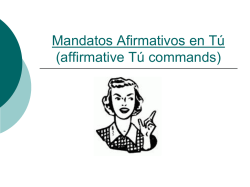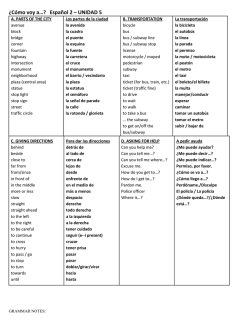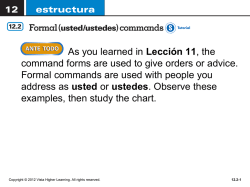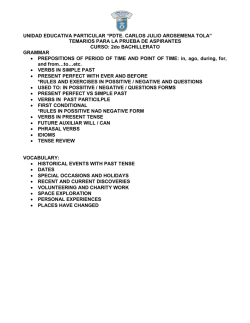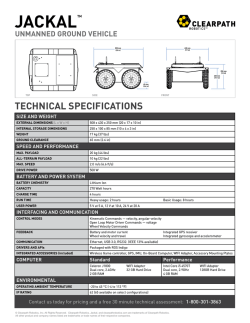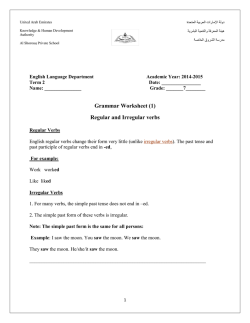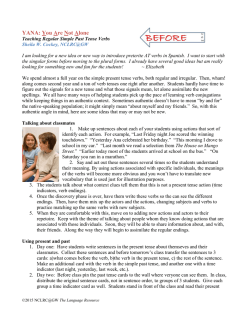
informal commands overview
Spanish Informal Commands Commands - telling somebody to DO something! Commands are when you are telling (not asking!) somebody to DO something. Here are patterns for someone you would call “tú.” Commands are important because if you go to a Spanish speaking country, they are one of the first things you will listen to! Practice saying the following commands in their affirmative and negative forms. Do you spot the patterns? What would be the negative command for the verb bailar? llamar call llama! no llames tomar take toma! no tomes comer eat come! no comas ver see ve! no veas dormir sleep duerme! no duermas escribir write escribe! no escribas Intro to Informal Commands (mandatos informales) The following is meant as a supplement to the p 104 book explanation of tú commands. It can't hurt to see it all one more time: I. Mandatos afirmativos: Affirmative tú commands are pretty easy. You simply use the regular THIRD PERSON (él/Ud) form of the verb: Yo quiero cantar --> Pues, ¡canta! Yo quiero vivir --> Pues, ¡vive! There are nine common verbs that have irregular tú command forms: decir --> di salir --> sal hacer --> haz poner --> pon tener --> ten venir --> ven ser --> sé ir --> ve Some of these verbs have compound forms which will also show the irregularity: detener --> detén (to detain, hold back) obtener --> ?? rehacer-->?? II. Mandatos negativos: It's a little harder to tell someone not to do something. Negative tú commands are formed like Ud. commands (using the subjunctive form): go back to the regular yo form of the verb and add the opposite ending (-ar verbs --> es, -er / -ir verbs --> as) Mirar --> miro --> no mires Leer --> leo --> no leas Decir --> digo --> no digas Tener --> tengo --> no tengas IIA. Cambios de ortografía: This is the same as the preterite yo form spell change. In negative commands, verbs ending in -car, -gar, or -zar must have a spell change to keep the sound. tocar--> No toques jugar--> No juegues empezar-->No empieces* *z before e becomes c. III. Posiciones de los pronombres y complementos: This is the same with Ud commands: direct object, indirect object, and reflexive pronouns are attached to affirmative commands and are not attached to negative commands. (Affirmative = yes, you do attach pronouns. Negative = no, you can't attach pronouns) You will need to write in an accent mark if adding the pronoun(s) makes the affirmative command more than two syllables long. The stress stays on the verb stem. Acuéstate ahora. No te acuestes tarde. Diles la verdad a tus padres. No les digas mentiras. Mira tu propio examen. Míralo. No mires la hoja de tu amigo. No la mires. Ponte los zapatos. Póntelos. No te pongas los zapatos. No te los pongas. Commands really aren't hard, they're just complicated. They take tons of practice. This is the only area where you as adults are at a disadvantage compared to children, because children hear hundreds of these a day -¡No hagas eso! ¡Haz lo que te dice tu mamá! ¡No hables tanto! Dile 'hola' a tu abuelita. etc, etc. People are generally a little more polite to adults. You can make up for this by repeating formulaic commands such as ¡No me digas! You're kidding; You don't say. Pasa After you (or Come in) Oye Excuse me / Hey! Mira Look... Cállate Shut up! Vete al diablo Go to the devil (There is a ruder expression for this, but you can look that up yourselves) NOMBRE __________________________________ Tú Commands. For each blank, give the correct form of the tú-command of the verb in infinitive in the first sentence. Put only one answer in each blank Debes ser bueno. ____________ bueno. Debes tener cuidado. ____________ cuidado. No debes perder tiempo. No ____________ tiempo. Debes hacer la tarea. ____________ la tarea. Debes comer bien. ____________ bien. No debes pedirle dinero. No le ____________ dinero. No debes comenzar ahora. No ____________ ahora. Debes seguir las instrucciones. ____________ las instrucciones. No debes ir al cine. No ____________ al cine. Debes jugar bien. ____________ bien. No debes estar aquí. No ____________ aquí. Debes cerrar la ventana. ____________ la ventana. Debes ir a clase. ____________ a clase. No debes ser tonto. No ____________ tonto. No debes traer los libros. No ____________ los libros. No debes hacer ruido. No ____________ ruido. Debes creer lo que digo. ____________ lo que digo. No debes buscar al profesor. No ____________ al profesor. Debes poner la mesa. ____________ la mesa. No debes salir esta noche. No ____________ esta noche. Formal Commands The formal commands are requests that you make of people in authority positions, elderly and respected individuals, including doctors, waiters, teachers... Waiters? Yes, in most Hispanic countries you will not find a young teenager bouncing over to your table with a "Hey! I'm Jim!" name-tag on. There is a more formal atmosphere, and servers are treated with the respect that all strangers receive. So use the Ud. (usted) form and formal commands unless you are invited to do otherwise. Here are the endings for the formal commands: AR VERBS IR/ER VERBS Usted e a Ustedes en an Let's make a Formal Command. We'll use the verb Hablar. We take the first person singular "Yo" form of the verb: hablo Now drop the "o" : hablNotice that the Subjunctive vowel endings for the -Ar verbs are "e"s -the vowel we normally use with -Ir and -Er verbs. And we use "a" with the -Ir and -Er verbs! We call this using the "opposite" ending. So now we attach the "opposite" ending to our verb stem to form our command: Hable! If the "Yo" form is irregular, the command will be irregular: If we use Traer, the present tense "Yo" form is Traigo We drop the "o" : TraigWe add the opposite ending: `a' And we have our command: Traiga Other irregulars: Salir Salgo Salga Hacer Hago Haga Poner Pongo Ponga Decir Digo Diga Venir Vengo Venga With Estar and Dar, we need to drop both the "O" and the "Y": Estar Estoy Esté Dar Doy Dé Voy Vaya Sé Sepa Ir (Ir is very irregular) Saber (it is also very irregular) Don't forget - if there is a stem change in the Present Tense, there will be a stem change in the Command (Present Subjunctive) form: Pedir Pido Pida Pensar Pienso Piense Dormir Duermo Duerma Atender Atiendo Atienda Hervir Hiervo Hierva Entender Entiendo Entienda Poder Puedo Pueda Freír Frío Fría Cambios de ortografía: This is the same as the preterite yo form spell change. In negative commands, verbs ending in -car, -gar, or -zar must have a spell change to keep the sound. tocar--> No toques jugar--> No juegues empezar-->No empieces* *z before e becomes c.
© Copyright 2026
